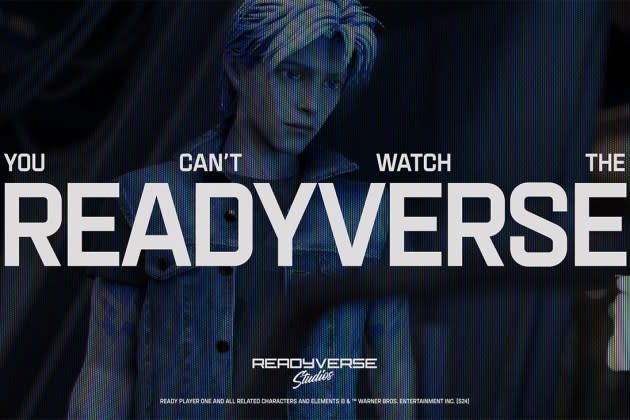A Real-Life ‘Ready Player One’? Author Inks Deal to Bring IP to the Metaverse
- Oops!Something went wrong.Please try again later.

In the 2011 novel Ready Player One and its 2018 feature film adaptation, citizens of a dystopian world escape to a virtual universe populated by avatars and filled with games, puzzles and settings featuring cultural references (including Pac-Man, Blade Runner and The Shining).
Now the author of the book, Ernest Cline, and the producer of the film, Dan Farah, are partnering with the AI and metaverse company Futureverse to bring Ready Player One to its own digital universe.
More from The Hollywood Reporter
Futureverse, Cline and Farah are launching a new company called Readyverse Studios, which will seek to bring IP to the metaverse … and they’ve secured the rights from Warner Bros. to make Ready Player One the first piece of that puzzle.
And while Cline’s novel and Steven Spielberg’s film adaptation were set in a dystopian world, the founders are banking on a more optimistic vision.
“Ernie in the wildest way, I mean, he mapped this out and he mapped it out with a real focus on openness at heart,” Futureverse and Readyverse Studios co-founder Shara Senderoff tells The Hollywood Reporter in an interview. “Obviously the movie opens in a dystopian stacks world which was the catalyst of the movie itself, but Ernie’s view is all about the openness of the technology. And he has a fundamental understanding of how these things needed to work.”
“The future has arrived even more quickly than I imagined,” added Cline. “With Readyverse Studios, we have the opportunity to leverage the revolutionary technology Futureverse has been building for several years to bring to life the best possible version of the metaverse. I’m confident with this team, we have the brightest minds and biggest hearts in place to lead us into the next chapter of our collective future … a future that would make Wade Watts and James Halliday proud.”
Readyverse also holds the rights to Cline’s other novels (including Ready Player Two) as well as his future works.
And already, the company has had discussions with other creators and owners of coveted intellectual property.
“We’ve already been begun conversations quietly with a few major studios and significant rights holders of beloved IP and they’re all leaning into figuring out collaborations with us,” Farah says. “Everyone’s really excited about this being the way to bring their IP to the metaverse.”
That includes Warner Bros., which produced and released Spielberg’s film adaptation of Cline’s novel that grossed $583 million globally.
“The Warner team has been super excited and supportive, and I think that the Ready Player One franchise rights will be the first of many IP rights deals we do with Warner,” Farah adds.
Of course it also helps to clearly define what their vision of the “metaverse” is. While Readyverse is thinking about VR and AR headsets (like the upcoming Vision Pro from Apple), they are also viewing it as a means of “interoperability” between platforms and devices.
“I think the idea of the metaverse in our heads is just the evolution of the Internet,” Futureverse co-founder Aaron McDonald says. “And to a user experience that’s a bit more connected and a bit more immersive. And we’re kind of already seeing it, it’s not this thing that’s going to happen, it’s something that’s been happening.”
“The average human that is born in this generation is gonna spend 46 years of their life looking at a screen,” McDonald adds. “So you’re in the metaverse. We’re there now, and it’s just about that kind of improvement of user experience and, and ownership of the things that we care about and love that’s really changing. Because there isn’t this digital society over here and this physical society we live in… those two things are inextricably linked. We can’t like pull them apart.”
Senderoff likens it to how you can use your credit card and Apple Pay at different merchants or restaraunts, or how you can bring your book with you from the library to the subway to your house. The goal is to create a digital version of interoperability that its users bring avatars, social connections or even products like clothing to whatever digital hub they choose.
And for Hollywood studios, it’s a fresh revenue stream at a time when they very much need it.
“We really see the the opportunity for big IP to have additional revenue streams additional opportunities for engagement in a way that is easy for them to build,” Senderoff says. “We knew that it would require coming together with Hollywood and holding hands in order to bridge these big and more old school forms of entertainment with the new form of technology that would be really opportunistic for everyone.”
“I think that Readyverse studios creates a great opportunity for studios to expand the reach of their IP, expand the fandoms of their IP and generate new revenue at a time that they need to increase revenue,” adds Farah, the producer. “But they also need to focus, head down on their core business of making movies and TV shows. Right? And so Readyverse Studios is an easy turnkey solution for them to trust their IP in a collaboration with people who know what they’re doing and understand their needs and desires too.”
Best of The Hollywood Reporter
Meet the World Builders: Hollywood's Top Physical Production Executives of 2023
Men in Blazers, Hollywood’s Favorite Soccer Podcast, Aims for a Global Empire

